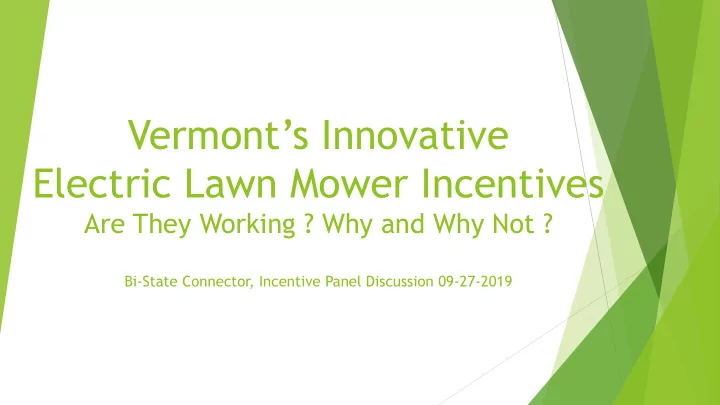

Vermont’s Innovative Electric Lawn Mower Incentives Are They Working ? Why and Why Not ? Bi-State Connector, Incentive Panel Discussion 09-27-2019
The Larger Mission of Eco-Equipment Supply To help stimulate the electrification of the lawn care industry and thereby eliminate the significant environmental impacts from gas- powered lawn care equipment These environmental impacts include: Noise pollution Air pollution CO2 emissions
Electric Utility Incentives Two primary objectives: Increase awareness that commercial electric lawn mowers exist Reduce the price to make them more cost competitive Incentives were created under Vermont’s Tier III Renewable Energy Standard that requires Vermont’s utilities offset a percentage of their GHG emissions, and reducing fossil fuel consumption is one way to do that
Methodology Used by GMP to Create its Electric Lawn Mower Incentive All incentives are created using a standard methodology based on: The expected reduction in fossil fuel use from the new technology The GHG emissions associated with that amount of fossil fuel The amount of electricity that will be used by the new technology The GHG emissions associated with that electricity The resources GMP used to determine these values included: Electricity use data from Mean Green Products (2.8 kW/hour) Fuel use data from conventional mower manufacturers (1 to 1.5 gal/hr) Argonne National Labs’ Greenhouse Gases, Regulated Emissions, and Energy Use in Transportation Model (GREET) Footprint Calculator US Dept of Energy’s Clean Cities Guide to Alternative Fuel Equipment
GMP Incentive “Use Case” Assumptions # of Hours and Fuel Use: 875 hours per year and 1.03 gallons per hour Annual Fuel Consumption: US Average: 900-2,000 gallons annually Vermont Average: 900 gallons annually Duty Cycle (ie. Operational Life) of Electric Mower: Lithium ion batteries - 6,000 hours (conservative) 6,000 hours divided by 875 hours/year = 7 years (rounded) Tier III Valuation: Gross Tier III Fossil Fuel Displaced - 81 MWh Equivalent Net Lifetime Tier III Savings - 73 MWh Annual Carbon Offset - 8 metric tons Lifetime Carbon Offset – 54 metric tons Increased Lifetime Electric Consumption – 67 MWh
Green Mountain Power Incentive Details and Results To-date: “Pilot” project launched in August 2018 for commercial mowers $700 Commercial incentive –0 mowers purchased $50 Residential incentive - ? mowers purchased (just launched) ZERO incentive applications processed
Burlington Electric Department Incentive Details and Results To-date: Launched Spring 2019 $3,500 Commercial incentive: 1 mower purchased (by BED) $100 for Residential incentive: 121 mowers purchased
Vermont Electric Co-op Incentive Details and Results To-Date: Launched Spring 2019 $100 Residential incentive: 36 mowers purchased $1,000 Commercial incentive: 0 mowers purchased
Washington Electric Co-op Incentive Details and Results To-Date Launched Spring 2019 $ 100 Residential incentive: 10 mowers purchased $1,000 Commercial incentive: 0 mowers purchased
Village of Orleans Electric Department Incentive Details and Results To-Date: Member of the Vermont Public Power Supply Authority (VPPSA) Launched January 2019 $1,500 Commercial incentive: 1 mower purchased
There’s been a relatively robust response to the residential mower incentives, but why have only two commercial electric mowers received incentive payments so far? Residential electric mowers are relatively inexpensive, they cost about the same as conventional mowers, and the existing incentives reduce their cost by 20 to 30% Conversely, commercial electric mowers are anywhere from 20% to 300% more expensive, than conventional mowers (depending on models, factory and institutional discounts, etc.) The existing incentives only reduce the cost of a $23,500 zero-turn mower with a 6 to 7 hr run-time by 3% (with a $1,000 incentive) to 15% (with a $3,500 incentive) Significant cultural and institutional barriers need to be overcome to stimulate the transition to commercial electric mowers
Cultural Barriers There exists both a lack of familiarity with, and a negative bias against electric lawn mowers Electric mowers handle a bit differently Different operation paradigm: Electric mowers are charged overnight while engines are refueled as needed Existing 6 to 7-plus hour run-time can be perceived as a limitation, although most mowers are rarely operated for more than 6 or 7 hrs/day The substantial environmental impacts from conventional lawn care equipment apparently aren’t yet considered relevant to environmental mission statements and/or GHG reduction goals at either the individual, institutional, municipal, or state level
Institutional Barriers The higher purchase price of electric mowers reduces the amount money available for other equipment in capital budgets Fuel costs for conventional mowers are often not tracked, which makes it harder to demonstrate the lower operating costs of electric mowers $4 to $5/hr for fuel compared to $0.45/hr for electricity Operating budgets are considered independently from capital budgets, which means the substantial savings in operating costs from electric mowers aren’t factored into purchasing decisions The higher purchase price is a disadvantage in competitive bids, unless the bid documents specify “electric” mowers Institutions may not be set up to finance mower purchases to reduce up-front costs while benefiting from lower life-cycle costs
Thank You For more information about Mean Green electric lawn mowers, to obtain a copy of the GMP incentive methodology, or my article ‘Overcoming the Cultural and Institutional Barriers to Electric Lawn Care Equipment’ Contact Steven Wisbaum, Eco-Equipment Supply 802-363-3930 steven@eco-equipmentsupply.com www.ecoequipmentsupply.com
Recommend
More recommend